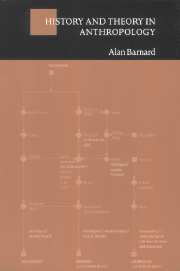Book contents
- Frontmatter
- Contents
- List of figures
- List of tables
- Preface
- 1 Visions of anthropology
- 2 Precursors of the anthropological tradition
- 3 Changing perspectives on evolution
- 4 Diffusionist and culture-area theories
- 5 Functionalism and structural-functionalism
- 6 Action-centred, processual, and Marxist perspectives
- 7 From relativism to cognitive science
- 8 Structuralism, from linguistics to anthropology
- 9 Poststructuralists, feminists, and (other) mavericks
- 10 Interpretive and postmodernist approaches
- 11 Conclusions
- Appendix 1 Dates of birth and death of individuals mentioned in the text
- Appendix 2 Glossary
- References
- Index
10 - Interpretive and postmodernist approaches
- Frontmatter
- Contents
- List of figures
- List of tables
- Preface
- 1 Visions of anthropology
- 2 Precursors of the anthropological tradition
- 3 Changing perspectives on evolution
- 4 Diffusionist and culture-area theories
- 5 Functionalism and structural-functionalism
- 6 Action-centred, processual, and Marxist perspectives
- 7 From relativism to cognitive science
- 8 Structuralism, from linguistics to anthropology
- 9 Poststructuralists, feminists, and (other) mavericks
- 10 Interpretive and postmodernist approaches
- 11 Conclusions
- Appendix 1 Dates of birth and death of individuals mentioned in the text
- Appendix 2 Glossary
- References
- Index
Summary
After Radcliffe-Brown's death in 1955, British anthropology went in four different directions. Some in the next generation simply continued Radcliffe-Brown's line of enquiry (notably Fortes and to some extent Goody). Others, such as Firth, came to emphasize individual action over social structure – an approach drawn partly from Malinowski's early fieldwork-based version of functionalism (chapter 5). This line of thought developed into theories such as processualism and transactionalism (chapter 6). Still others took to at least some of Lévi-Strauss' structuralist ideas (chapter 8), often adapting them to new interests in social process. Finally, a large number came eventually to follow Evans-Pritchard in his rejection of the idea of anthropology as a science, in favour of an interpretive approach which placed anthropology firmly within the humanities.
In the United States, Clifford Geertz began to propound his own style of interpretivism. Anthropology in his hands (and in Evans-Pritchard's) turned the linguistic analogy sideways. Cultures were no longer metaphorical ‘grammars’ to be figured out and written down; they were ‘languages’ to be translated into terms intelligible to members of other cultures – or more often than not, the anthropologist's own culture.
In France, outside anthropology, structuralism was under attack as the last bastion of ‘modernism’. Philosophers and literary critics there and their followers in North America developed new, ‘postmodern’ ways of looking at the world. To a great extent, this followed from the idea that the world itself had undergone a quiet revolution.
- Type
- Chapter
- Information
- History and Theory in Anthropology , pp. 158 - 177Publisher: Cambridge University PressPrint publication year: 2000



